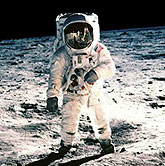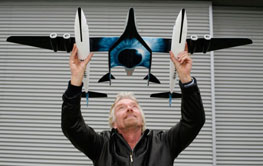Space Tourism: the final frontier

July 20 was the 41st anniversary of the historic first lunar landing – when American astronauts hopped, skipped, jumped and even played golf on the virgin moon. I wonder if the pioneering galactic travelers ever envisioned the possibility of "space tourism" launching during their lifetimes?
The concept would have been the stuff of science fiction back in 1969 – but the reality looks increasingly likely. That's assuming Neil Armstrong, Buzz Aldrin, and the other one (Michael Collins, who orbited the pair in a command module, waiting to ferry them back to Earth) can hold out till 2012 – when Virgin Galactic aims to liftoff Richard Branson's commercial suborbital flight program.
Five days before the moon-landing anniversary, Mr. Branson's upwardly mobile company tested its custom-designed, "clean tech" spacecraft, VSS Enterprise, with a crew for the first time. "Objectives achieved," Virgin Galactic's website announced, after the six-hour inaugural manned flight over California's Mojave desert, during which co-pilots evaluated the spaceship's systems. Testing is due to run through 2011.
To date, fewer than 500 people can claim membership of the ultra-exclusive space-travel club. Virgin Galactic, however, has already accepted more than US$65million worth of reservations from 335 future amateur-nauts. Each paid a $20,000 advance deposit on the $200,000 total cost of the package. (Don't hold your breath for economy price tickets into space.)
The two-and-a-half hour flights will propel six tourists 60 miles into space to see the Earth's curvature from an altitude of 110km – and experience five minutes of zero-gravity weightlessness. Theoretically, the craft will then glide back to Earth, landing like a normal plane.
"We are the only company in the world offering spaceship travel,"  60-year-old Branson has boasted. The program also has revolutionary implications for worldly travel. In June, the bearded entrepreneur told the UK's Daily Mail that an intercontinental Virgin Galactic service – which could dramatically slash flight times between the UK and Australia from 24 hours to just 2.5 hours – is also in the pipeline.
60-year-old Branson has boasted. The program also has revolutionary implications for worldly travel. In June, the bearded entrepreneur told the UK's Daily Mail that an intercontinental Virgin Galactic service – which could dramatically slash flight times between the UK and Australia from 24 hours to just 2.5 hours – is also in the pipeline.
"'We have to get the basics right first and it will take a number of years but it will be very, very fast and environmentally friendly," claimed the publicity generating industrialist, whose Virgin brand dabbles in over 360 companies.
The sky's not the limit for 'rebel' billionaire Richard Branson
"'It will make Concorde look old fashioned and will put supersonic travel back on the agenda."
Would all this have been possible had the original Apollo 11 mission failed? In 1999 it was revealed that President Richard Nixon had a precautionary speech prepared should disaster strike – stranding the intrepid trio where no men had boldly gone before.
"Fate has ordained that the men who went to the moon to explore in peace will stay on the moon to rest in peace," the lament opens. "For every human being who looks up at the moon in the nights to come will know that there is some corner of another world that is forever mankind."
Mercifully, an astronomic tragedy was avoided on that occasion (although rumors of lost Russian cosmonauts have swirled for decades) so the calamity mitigating speech was never needed. Let's hope Mr. Branson and Virgin Galactic enjoy the same good fortune once their ambitious, high-flying endeavor gets off the ground.
-- Published by Travel+Leisure, 2010